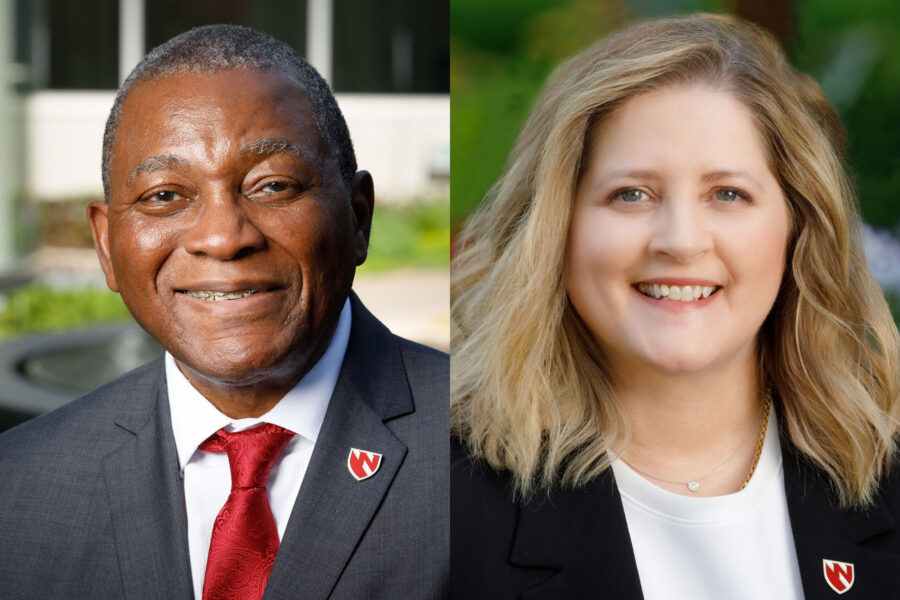Enrollment was the focus of this month’s all-campus forum, featuring UNMC Interim Chancellor Dele Davies, MD, and special guest Jane Meza, PhD, interim vice chancellor for academic affairs.
Dr. Davies also congratulated Jeffrey P. Gold, MD, on his formal installation as the ninth president of the University of Nebraska System, fielded an array of questions from the campus community, gave an update on several issues and shined a spotlight on two students who told the in-person and Zoom audience why they chose UNMC.
Dr. Meza provided insight on UNMC’s increase in enrollment for a record 24th consecutive year. This fall, UNMC currently enrolls 4,703 students, an increase of 3.25% over the previous year, Dr. Meza said. More than 75% come from the state of Nebraska.
“I want to take note of all the hard work by many people,” that went into this achievement, Dr. Davies said. “This does not happen by chance.”
One of the biggest areas of growth was in UNMC Graduate Studies, which now boasts the medical center’s third-largest enrollment. The relatively new Interdisciplinary Graduate Program in Biomedical Sciences (IGPBS) allows students the time and freedom to choose their areas of study and adjust to graduate school, Dr. Meza said. Greater support through increased training grants and graduate students earning their own funding and the growth in faculty research funding also have contributed to retention and growth, Dr. Meza said.
Kearney expansion and addition of new programs also have contributed to UNMC’s enrollment growth, Dr. Meza said.
Caroline Stokes, a master’s in genetic counseling student, is among those who have enrolled at UNMC for one of those newer programs. She told the forum audience that she appreciates the faculty encouraging her to seek out challenges.
Reagan TeKolste was aware of UNMC as an undergraduate at the University of Nebraska at Kearney, saying, “I grew up in Nebraska, and UNMC is literally everywhere.” She works in the UNMC Division of Diabetes, Endocrinology and Metabolism and decided to further her education as a graduate student.
Philip Covington, EdD, associate vice chancellor for student success, added to the discussion by reporting that UNMC is in phase one of implementing a new CRM (customer relationship management) system to help foster engagement with potential students.
Said Dr. Davies, “This will improve our ability to communicate with prospective students and track them along their path before and after they come to us. It will also help us shepherd students and give them a clearer path to take to get to each profession we offer and to support them along the way.”
A student recruitment video produced by UNMC Strategic Communications also was featured at the forum. Watch an upcoming UNMC Today for the video.
In other news, Dr. Davies:
- Encouraged the UNMC community to receive flu and COVID-19 vaccinations, as he plans to. Watch for info on UNMC College of Pharmacy and Nebraska Medicine vaccination clinics, including in today’s UNMC Today. With community COVID-19 transmission at high levels, UNMC plans to monitor numbers closely. The campus invested more than $1 million in upgrades to air flow and ventilation to improve safety during the COVID pandemic.
- Addressed questions about Project NExT. Its first phase, Project Health, is moving along. Phases 2 and 3 are projected to involve regional and national federal partnerships. Work with Congress continues toward achieving that funding, Dr. Davies said. “We fully expect that it will come.”
- Recalled a successful community outreach trip to Macy, Nebraska, with invitation from the Nebraska Health, Education, Advocacy and Leadership across Indigenous and Native Generations Project (NE-HEALING).
- Addressed his current major priorities, including listening: “The risk being here for 12 years is taking for granted that I know what everybody is thinking,” Dr. Davies said. He said he will continue to seek out viewpoints both on campus and in communities throughout the state over the next few weeks.
- He also will concentrate on moving forward major priorities including Project NExT, Kearney expansion, development of Saddle Creek, new student housing and the Only in Nebraska capital campaign.
“But among my vision and goals,” Dr. Davies said, “Is, one; that everyone feels welcome and sees UNMC as a place they belong, and our trainees continue to become competent, compassionate and caring health care professionals. This is critical for us, as the state’s only health professions training campus. Our graduates need to know how to care for everybody from every background, and the patients we serve must know when they are with us that they are going to get the best care they deserve.
“And two, for every student in Nebraska, whether they are from Valentine, North Omaha or Broken Bow, or any other part of the state – if they want to become a health care professional, there will be no barriers for them to achieve their dream – as close to home as possible.”
